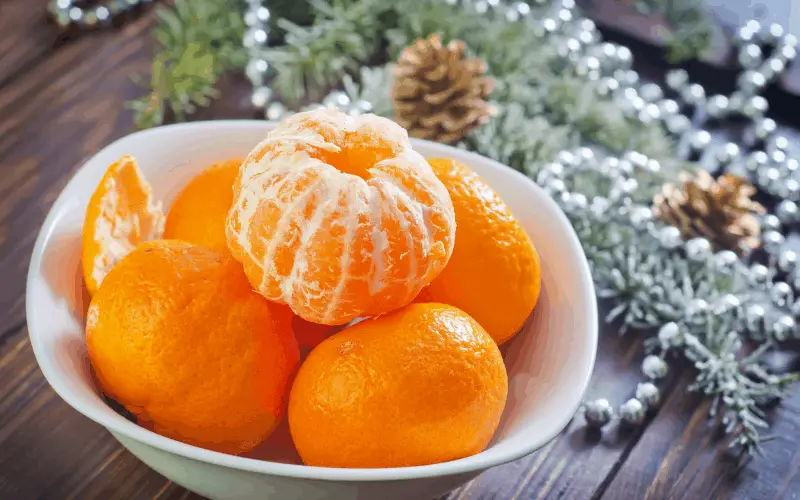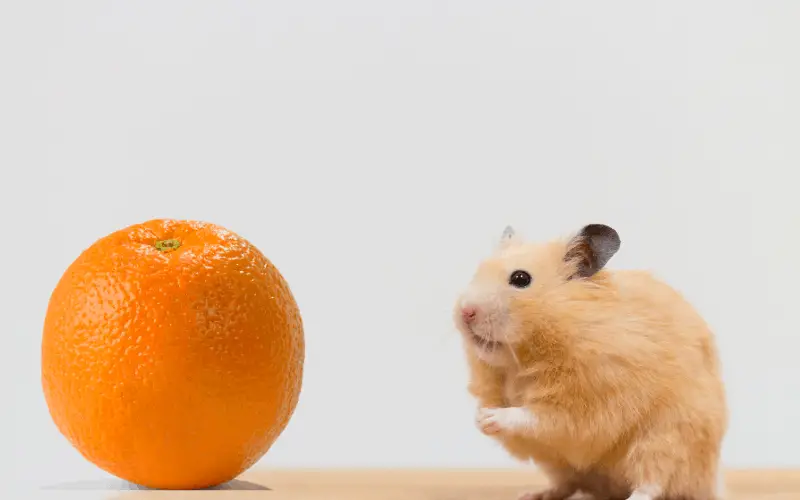If you want to have healthy and lively hamsters, you must provide them with a balanced and rich diet in nutrients.
Besides commercial hamster foods, it is safe to give hamsters fruits and vegetables occasionally.
However, it is important to know that not all vegetables and fruits are good for hamsters.
So, if you are considering giving your hamster a treat of fruits and vegetables, you may ask, can hamsters eat oranges? Yes, hamsters can eat oranges, but it is better not to give them orange because of their high acidic content. You can serve them other fruits like apples, tomatoes, and bread.
In this post, we’ll tell you all you need to know about hamsters and oranges.
Can Hamsters Eat Oranges?
Oranges are not really okay for hamsters. In short, all citrus fruits are hardly a choice for hamsters.
Citrus fruits such as oranges, tangerines, lemons, and grapefruits have highly acidic content.
If you love your hamster, you will save him a lot of trouble by removing oranges from his diet.
The high acidic content of the fruit can cause your hamster some stomach upset as well as diarrhea.
Oranges can also lead to serious tooth degradation among hamsters.
If you want to give your hamster some oranges, you must start with a minimal quantity the first time. Watch your hamster closely and see if his health is affected by anyhow.
If you notice your hamster’s health is affected or he develops a runny stomach, you had better stop feeding him.
Make the safety of your hamster your priority.
A tiny portion of oranges will not kill your hamster but might cause some digestive troubles and make your hamster sick.
For that reason, you should really discover some other fruits that are protected for hamsters, such as bananas, cherries, apples, strawberries, or pears.
Can Hamsters Eat Mandarin Oranges?

Mandarin oranges are grown from a small citrus tree called mandarin. It looks like other types of orange but is eaten plain or in fruit salads.
As you will see in the nutritional table below about mandarin oranges, they contain a little phosphorus, calcium, quite a lot of acid, and sugar.
The bad news is that hamsters cannot eat mandarin oranges. This goes for all species of hamsters, even Syrians and Robo’s, but if you must serve your hamsters orange, do so in a little portion.
This is because they are just too acidic and high in sugar for them to eat.
Orange can make hamsters sick if eaten because they are so acidic. As a result, we suggest you avoid feeding your hamsters orange.
Nutritional Facts of Mandarin Oranges
- Nutritional value per 100 g (3.5 oz)
- Energy 223 kJ (53 kcal)
- Carbohydrates
- 13.34 g
- Sugars 10.58 g
- Dietary fiber 1.8 g
- Fat 0.31 g
- Protein 0.81 g
- Vitamins
- Vitamin A equiv.
- beta-carotene
- (4%) 34 μg
- (1%) 155 μg
- Thiamine (B1) (5%) 0.058 mg
- Riboflavin (B2) (3%) 0.036 mg
- Niacin (B3) (3%) 0.376 mg
- Pantothenic acid (B5)
- (4%) 0.216 mg
- Vitamin B6 (6%) 0.078 mg
- Folate (B9) (4%) 16 μg
- Choline (2%) 10.2 mg
- Vitamin C (32%) 26.7 mg
- Vitamin E (1%) 0.2 mg
- Minerals
- Calcium (4%) 37 mg
- Iron (1%) 0.15 mg
- Magnesium (3%) 12 mg
- Manganese (2%) 0.039 mg
- Phosphorus (3%) 20 mg
- Potassium (4%) 166 mg
- Sodium (0%) 2 mg
- Zinc (1%) 0.07 mg
From the table above, it’s clear that mandarin oranges are not a choice snack for hamsters.
The water, acidic, salt, sugar, phosphorus, fat, and calcium contents are of particular interest as far as hamsters are concerned.
Can Hamsters Eat Orange Peels?

Alright, we have established that oranges are not safe for hamsters. Could that be the same with orange peels?
Let’s look at that too.
If oranges are not good for hamsters, it is not likely that their peels are better.
Any citrus fruit, including oranges, and their peels are not good for hamsters to eat. They will hurt their stomachs and make them sick because of their acidity.
The hamsters may not even stand the choking aroma of the orange peels.
Further, bacteria can hide away in orange peels. That makes it unsafe for consumption.
What Fruits Can Hamsters Eat?
Besides the commercial hamster foods, hamsters need fruits and vegetables.
The best treats for them are foods that are similar to what they might find in the wild.
So…
What Fruits Can Hamsters Eat?
Fresh vegetables are good for hamsters. Such veggies that can enrich your hamster’s diet include carrots, squash, broccoli, cauliflower, cucumber, romaine lettuce, spinach, and other greens.
They should be thoroughly washed with water each time they are to be served the hamsters.
Fresh fruits such as apples, pears, bananas, grapes, and most berries are also good for hamsters.
But remember never to give any citrus fruits like oranges, limes, lemons, or grapefruit. But serve them a little portion once In a week.
What Fruits Are Bad For Hamsters?
Except in the case of diseases or accidents, your dwarf hamster can live up to three years. But choosing the wrong food for him may shorten his lifespan.
Not every fruit is healthy for your dwarf hamster. Some can make him sick and dying. Such should be kept out of his diet.
Some examples of such fruits and vegetables are tomato leaves, raw potatoes, onions, oranges, and lemons. The last two fruits are too acidic for him.
Read Also: Can Hamsters Eat Cheese?
Conclusion
Oranges and other citrus fruits are not actually good for hamsters. First, they contain acids that could cause a great disturbance to the little creatures.
Second, oranges’ high water content causes hamsters to take more water than the approved 10 ml they can take a day.
Also, Not all food good for humans is good for hamsters.
Because hamster’s tummies are sensitive and might not be able to digest and feed on human foods.
Finally, if you care for your hamster and want them to maintain good health, don’t give oranges to your hamster.

